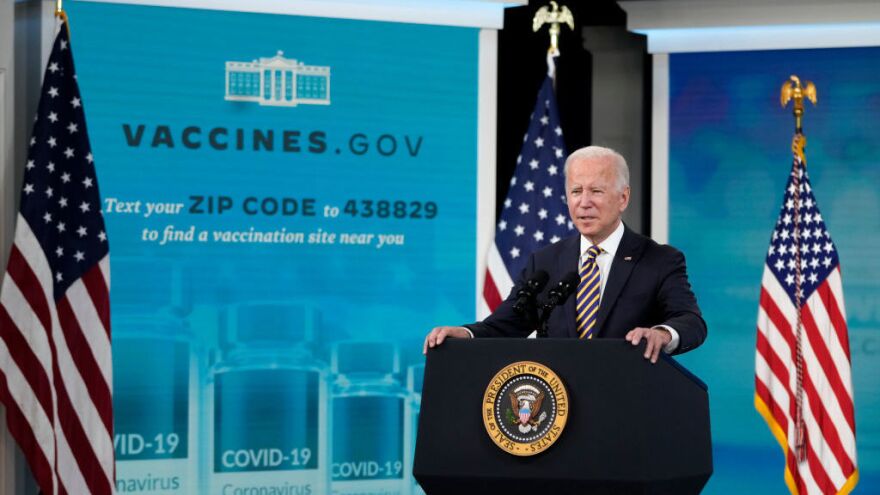Updated December 18, 2021 at 9:29 AM ET
A Biden administration rule that requires workers at companies with 100 or more employees to be vaccinated against Covid or undergo weekly testing is back on.
The 6th Circuit Court of Appeals lifted a stay on the rule Friday evening. The rule was blocked on Nov. 6, just one day after it was formally issued by the federal Occupational Safety and Health Administration.
In dozens of lawsuits around the country, Republican-led states, businesses, religious groups and some individuals charged the Biden administration with overreach. Among their arguments: OSHA does not have the legal authority to issue a rule regarding a society-wide health concern that goes far beyond the workplace. Even if reducing the risk of Covid is compelling, it is not necessarily a "grave danger," as OSHA has declared it to be, they said. In addition, they argued that complying with the rule would be costly and could lead to worker shortages.
A three-judge panel of the 6th Circuit found these injuries asserted by the petitioners to be "entirely speculative," and the costs of delaying implementation of the rule to be comparatively high.
"Fundamentally, the [rule] is an important step in curtailing the transmission of a deadly virus that has killed over 800,000 people in the United States, brought our healthcare system to its knees, forced businesses to shut down for months on end, and cost hundreds of thousands of workers their jobs," wrote Circuit Judge Jane B. Stranch, an Obama appointee.
"The harm to the government and the public interest outweighs any irreparable injury to the individual petitioners who may be subject to a vaccination policy," she said.
As expected, by Saturday morning, dozens of business groups and religious organizations had asked the Supreme Court for a new emergency stay.
The National Retail Federation said it would continue to prepare its members to comply with this "onerous mandate," but added it would not be feasible for employers to do so during the holiday season.
The White House welcomed the appeals court's decision, reiterating that the rule will ensure businesses will enact measures to protect employees.
In a statement, the White House pointed out that the highly transmissible Omicron variant makes it "critical we move forward with vaccination requirements and protections for workers with the urgency needed in this moment."
Just before midnight, the Labor Department announced that OSHA would not issue citations for noncompliance with the testing requirement before Feb. 9, "so long as an employer is exercising reasonable, good faith efforts to come into compliance" with the rule.
OSHA had estimated that the vaccine-or-test rule could save more than 6,500 lives and prevent over 250,000 hospitalizations in the six months that it would be in effect.
In addition to the vaccine and testing requirements, the rule requires companies to determine who among their workers are vaccinated and who are not, and to enforce a mask mandate for unvaccinated workers. The new deadline for those steps is Jan. 10.
The ruling is a big victory for the Biden administration vis a vis private employers.
Earlier this year, companies that implemented vaccine mandates on their own saw a dramatic uptake of vaccinations among their workers. Tyson Food and United Airlines reached vaccination rates of more than 95%. Neither offered their employees a testing option.
The Biden administration's attempts to similarly mandate vaccines for health care workers and federal contractors are currently held up in courts. Its mandate covering health care workers at facilities that receive Medicaid or Medicare funding remains blocked in about half the states, while its mandate for federal contractors remains blocked nationwide. Those cases could also end up at the Supreme Court.
Copyright 2021 NPR. To see more, visit https://www.npr.org.



